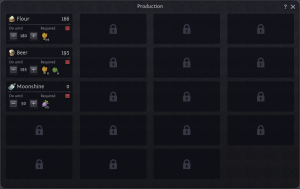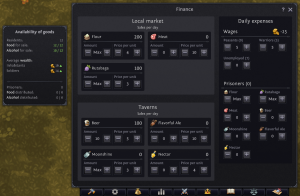Beginner's Guide
Norland begins with you arriving in a small village with the intention of turning it into the thriving capital of your future kingdom.
After starting a new game, the difficulty of the game will gradually increase during the first few days after starting the game. New mechanics will be introduced gradually, allowing players to adapt and develop their settlement peacefully. This behavior can be disabled by enabling Hardcore mode when starting a new game but this is not recommended for new players.
Beginner tips
- Every game will start with a king and a heir and a queen who is captured in a forest bandits' camp. The first actual objective is to rescue her. In the beginning it is better to use mercenaries for armies. 5 or 6 mercenaries will be enough. They will arrive in one or two days, during which you can handle the initial settlement development.
- The first buildings that should be constructed are Lumbermill (for construction materials), Rutabaga Field (for food), Tavern (for selling alcohol), Altar (for satisfying the Piety need) and Library (for gaining knowledge).
- By creating a strong army you can force neighbors into vassalage and use their tribute for further development.
- Always assign lords to tasks best matching their skills:
- Lords with high
 Command skill can effectively destroy forest bandit camps, gaining rich loot.
Command skill can effectively destroy forest bandit camps, gaining rich loot. - Lords with high
 Management skill can produce a lot of extra goods - the more complex the goods and the higher the level of production building, the more profitable it is.
Management skill can produce a lot of extra goods - the more complex the goods and the higher the level of production building, the more profitable it is. - Lords with high
 Trade skill will help you make a profit when trading with neighbors or the Holy Caravan.
Trade skill will help you make a profit when trading with neighbors or the Holy Caravan. - Lords with high
 Persuasion skill are useful for effective convert actions on the world map and later improving relations with neighbors.
Persuasion skill are useful for effective convert actions on the world map and later improving relations with neighbors. - Lords with high
 Manners skill can seduce foreign lords to your side.
Manners skill can seduce foreign lords to your side. - Lords with high
 Teaching skill can quickly train peasants to use in place of expensive mercenaries.
Teaching skill can quickly train peasants to use in place of expensive mercenaries. - Lords with high
 Intellect skill will gain knowledge quicker.
Intellect skill will gain knowledge quicker.
- Lords with high
Population
Population is divided into 4 categories of people: peasants, warriors, criminals and slaves.
All characters age at a rate of one year per day.
Peasants migrate to the city, the the number of migrating peasants depending on the average Mood.
If there are not enough living spaces people will become Homeless, which reduces their Mood by 14. Homeless people will sleep inside a Temple if one is built and in front of the Hall if no Temple is built.
Characters who are unhappy or listen to a Sermon of Faith at a Temple may become fanatic. Fanatic characters have the "Fanatically religious" thought thought (+12 Mood) and also enjoy pain. If fanatics stay unhappy for too long they can raise a rebellion.
If a character consumes alcohol too often they may become dependent on it. The character will want to drink alcohol every day and will gain increasingly negative thoughts each day they don't drink. The dependency may randomly end after a mental breakdown or if the character does not drink alcohol for a few days.
Once the city reaches at least 40 population the bishop may visit it for a few days. Lords have a number of special actions with the bishop. If a Temple is constructed the bishop will conduct the sermon. The bishop can provoke a religious uprising if he quarrels with any of the lords. If he dies from anything except natural causes an inquisition army will head to attack the city.
Needs, thoughts and mood
Every character has a Mood, which ranges from 0 to 100 and is the sum of all thoughts. Thoughts arise from events, desires and needs. If a need is fulfilled it will give a positive thought, while if it is unfulfilled it will give a negative thought. If Mood falls below 25 the character will become unhappy. The average mood of peasants affects the level of migration.
Needs generally decreases over time and they are fulfilled through specific actions character mostly perform on their own. The need for Rest is automatically replenished when not working. There are 5 needs:
 Sleep: If it becomes completely empty, the character will collapse and fall asleep regardless of what is happening. It is satisfied by sleeping.
Sleep: If it becomes completely empty, the character will collapse and fall asleep regardless of what is happening. It is satisfied by sleeping. Food: If it becomes low it can lead to hunger and eventually starvation. It is satisfied by consuming food such as Flour, Meat or Rutabagas.
Food: If it becomes low it can lead to hunger and eventually starvation. It is satisfied by consuming food such as Flour, Meat or Rutabagas. Rest: It is replenished slowly by not working and quickly by consuming alcohol at a Tavern.
Rest: It is replenished slowly by not working and quickly by consuming alcohol at a Tavern. Piety: It is satisfied slowly through praying and quicker at Temples or Altars.
Piety: It is satisfied slowly through praying and quicker at Temples or Altars. Care: Only available to children. Is it satisfied by actions between parents and their child.
Care: Only available to children. Is it satisfied by actions between parents and their child. Sex: Only available to adults. Is it satisfied during dating.
Sex: Only available to adults. Is it satisfied during dating.
Characters will pray between 8 AM and 9 AM. If there is a Temple they will pray there. If there isn't any but there is an Altar they will pray there. Otherwise they will pray at home but this will be less effective.
Slaves
Slaves are paid directly in resources rather than Gold and are given jobs before peasants. By default they are only paid in food but they can be given alcohol as well from the Finance menu. They are housed in Slave Barn buildings. The building requires a worker to give slaves their food and alcohol.
Slaves may or may not yearn for freedom, which is shown when hovering over them. If a slave yearning for freedom is unhappy they may attempt to escape. The chances of escape are higher if they are homeless.
Enough unhappy slaves can instigate a slave uprising.
Slaves can be obtained by punishing criminals or capturing them after a battle. They can also be bought and sold at the Holy Caravan. Each slave has a price of 15 Gold, which can be increased by the following:
- +15 if the slave is 14-15 years old
- +10 if the slave is 16-25 years old
- +5 if the slave is 26-35 years old
- +20 if the slave is female
- +10 if the slave is not yearning for freedom
Criminals
Peasants who are unemployed and unhappy for too long will either leave the city or become criminals. Criminals will steal Flour, rob peasants on the street, and even break into the homes of peasants. After a few days they may become cutthroats.
Crime can be combated by deploying patrols, constructing Scaffold buildings or terror.
Building management
Some buildings require workers and instructions to function and will display an icon above if they do not currently have any. Instructions are given by assigning a lord as a manager. The same lord can be appointed as manager to multiple buildings and will try to visit each building every day, starting with the buildings that require instructions the most. Failing that, the instructions given by them are valid for three days. Each lord gives a production bonus that scales with its Management skill.
Once the workers receive instructions from managers they will begin working. At 6 PM workers will carry the produced resources to the warehouse. After work they receive their salaries.
Buildings that produce basic resources will produce them continuously without any input from the player. But buildings that produce resources that require other resources need direct orders from the player in the Production menu, where you can either place a one-time order to produce a certain amount or set a continuous production until a set amount is reached.
Hovering over the Economic Summary will list buildings that do not have instructions, that have insufficient workers, that are broken or non-functioning, as well as fields on the verge of depletion.
Finance
The Finance menu is is where wages and the sale of resources can be adjusted. On the left side you can adjust the maximum amount of a certain resource that can be sold every day, as well as its cost. On the right side you can adjust the wages for the population. Peasants, Warriors and Unemployed are paid with Gold while slaves are paid with food and alcohol resources.
Every character consumes 1 food per day, so the amount of food produced should be at least equal to the population and the food price per unit should be lower than the workers' salary. Characters who work also need alcohol every few days and their mood can be regulated with the quantity and price of the sold alcohol. Slaves receive food (and alcohol if allowed) for free but require a functioning Slave Barns building for that. Markets open after 6 PM.
Holy Caravan
The Holy Caravan arrives every 2-3 days and is the primary source of Gold and Holy Rings. It's also a great source of books and slaves. Prices may randomly change but they also depend on a lesser extent on the Trade skill of the lord trading with the Holy Caravan.
 Hooded Horse Wikis
Hooded Horse Wikis

